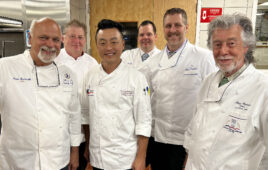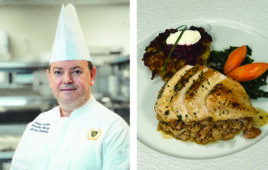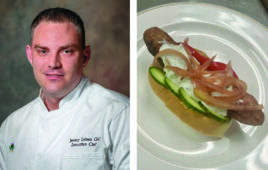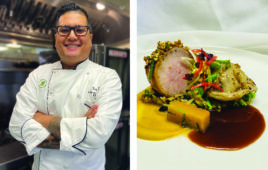Baltusrol GC’s Executive Chef Edward Stone, Clubhouse Manager Brian Baldwin and General Manager/COO Kevin Vitale are raising the bar on an already impressive dining program.

Baltusrol GC’s Executive Chef Edward Stone, Clubhouse Manager Brian Baldwin and General Manager/COO Kevin Vitale are raising the bar on an already impressive dining program.
Much about the food-and-beverage program at Baltusrol Golf Club (Springfield, N.J.) is masterful. And as it continues to evolve, it has become synonymous with excellence. It is of the same caliber as the club’s prestigious golf courses.
This is thanks in large part to the skillful collaboration between Executive Chef Edward Stone and Clubhouse Manager Brian Baldwin, as well as the support of General Manager/COO Kevin Vitale. Individually, these men bring unique skillsets to the table. Collectively, they’re unstoppable.
Located just a stone’s throw from New York City, Baltusrol has played host to seven U.S. Open tournaments, as well as nearly a dozen other championships. Later this summer, the club will host the 98th PGA Championship, from July 25th through July 31st.
Inside its storied clubhouse, Baltusrol has three dining spaces: a fine dining room, the grill room and terrace, and the solarium and patio.
Baltusrol Golf ClubAT A GLANCELocation: Springfield, N.J. |
“Everything we do, we do at the highest level, with near-perfect consistency,” says Kevin Vitale, General Manager/COO. “We’re not complicated. We don’t have pools or tennis courts. We have two championship golf courses, and an outstanding food-and-beverage program.”
Vitale was instrumental in building the team that has grown the F&B operation from $2 million to closer to $4.2 million. He brought Stone on board more than a decade ago, and brought Baldwin back to the club last year as Clubhouse Manager, after Baldwin spent three years in management positions at Fiddler’s Elbow Country Club (Bedminster Township, N.J).
“I value the passion that both Chef [Stone] and [Baldwin] have for this industry and this club,” says Vitale. “Chef is an incredibly talented culinarian. He is strategic and deliberate. He’s smart, he understands our goals, and he operates at the highest level of his profession. [Baldwin] is constantly looking at how we can improve what we do. He’s focused on training, and he’s a natural leader.”
Set in Stone
“Chef has incredibly high standards. That’s part of what makes him such a strong leader.” – Kevin Vitale, General Manager/COO
Great food cannot be hurried. It takes immense skill, an impeccable palate and a commitment to constant improvement. The details of every recipe must be scrupulously analyzed. The best ingredients must be relentlessly sought. And precision and consistency are paramount.
Stone is tireless in his pursuit of great food. For him and the team he’s cultivated at Baltusrol, including Executive Sous Chef Efrain Vasquez, Sous Chef Manuel Ramerez and Pastry Chef Tim Koch, excellence is a continuing and evolving journey, not a destination.
“Chef has incredibly high standards,” says Vitale. “That’s part of what makes him such a strong leader.”
Even as a 121-year-old traditional golf club, Baltusrol is aggressive in evolving its food-and-beverage program. Menus change frequently to highlight seasonal ingredients, and encourage members to dine even when they aren’t golfing.
“Flexibility is important,” says Stone. “It allows us to focus on dishes that are seasonally at their peak.”
Stone relies on his classic French training to ensure that dishes are technically sound. He also encourages the culinarians in his kitchen to develop new and inventive dishes. He attracts top talent and interns from across the country and molds them into stronger culinarians.
“If a cook has an idea or wants to try a new technique on a dish, he’s going to be more invested in its success,” says Stone, who notes that ninety percent of the dishes on Baltusrol’s menus are scratch-cooked. “This kitchen inspires creativity and innovation. We push each other to be better, to think of new dishes and better ways to serve our members.”
Baltusrol puts a great deal of stock into sourcing quality fish and meat. Nothing is frozen, and primal cuts are always purchased so that the team can carve them as needed.
“We have very little waste, because we use the bones to make demi-glace and stock,” says Stone. “This also helps the cooks learn more techniques.”
Later this year, Stone will introduce a small-plates menu, to highlight a variety of cuisines and to speed up service.
“Our small-plates menu will feature casual dishes that are easy to execute and fun to eat,” he says.
Making the House a Home
Over the past decade, Baltusrol has renovated key spaces inside its 46,000-sq. ft. clubhouse, including its kitchen.
“We redesigned the kitchen nearly a decade ago and changed the layout to make it all one level,” says Stone. “It’s more efficient and our cooks can now switch between banquet and a la carte as needed.” This is useful, he notes, because banquets make up half of Baltusrol’s F&B business.
In the ten years since that renovation, the kitchen hasn’t needed many updates.What has changed recently are two unused spaces that have been transformed into wine-centric rooms. One is a tasting room—named the Eldridge Room—perfect for wine dinners and upscale private dining. The other is a wine cellar that will increase the club’s storage capacity from 3,500 bottles to a little over 5,000.
“The Eldridge Room used to be a sitting lounge before we built the club bar,” says Baldwin. “It was rarely used. So we renovated it and created this high-end dining space where members work with Chef and me directly to create a menu that’s exceptional and expertly paired.”
When a member books a dinner in the Eldridge Room—which seats between six and eighteen people—the group is served a minimum of six courses.
“We’re offering members a chance to enjoy an exclusive dining experience unique to Baltusrol,” says Baldwin, who services the room while Stone presents and explains each course.
The club’s new wine cellar is located in a reclaimed guest room. The room was gutted, vapor-proofed and custom-fitted with black walnut wine racks. It, too, can be used for private dining occasions or tastings.
“We wanted to maximize storage, but still have [the cellar] be a member area,” says Baldwin.
Rounding out its new focus on wine, Baltusrol expanded its by-the-glass program to feature 40 different varieties, ranging in price from $12/glass up to $25/glass.
Craft Craze
Wine isn’t the only beverage trending at Baltusrol. Microbrews and craft cocktails are popular with members, too, thanks in large part to new initiatives implemented under Baldwin’s direction.
Clubhouse Manager Brian Baldwin (left) and Executive Chef Edward Stone are passionate about the club and its future.
“We’re only forty minutes from New York City, so our competition is some of the best in the world,” says Baldwin, who started at Baltusrol as a server in 2008 and worked his way up to Assistant Clubhouse Manager, before leaving in 2012 to work as Fiddler’s Elbow’s Clubhouse Manager and Assistant General Manager.
“Chef Stone is a pioneer and has been doing farm-to-fork cuisine before it became a popular movement,” Baldwin adds. “He focuses on quality, seasonality and freshness, so we try to mirror that in all aspects of the beverage program.”
No one was sure if microbrews would work at Baltusrol, but Baldwin was convinced they could. He started by introducing four well-known craft beers. Within the first month, the club went through 30 cases—and demand has not slowed since.
“We now offer ten microbrews to our membership across the property,” says Baldwin, who notes that these beers are also made available to members on the golf courses.
The mix features a handful of local brews alongside beer from Colorado, California and elsewhere. The selection changes every month, so seasonal ales can be highlighted.
Tastings have been critical to the success of this program. When Baltusrol first introduced the craft selections, tasting tables were set up at the club’s member-guest event, so members could sample them without having to commit to a whole glass.
“As demand has grown, more members request craft beer,” says Baldwin.
Training has also been important. “We train and cross-train to make sure all servers and the front-of-house staff know what beers we have available, what they taste like and where they’re from,” says Baldwin, who notes that servers take monthly tests on food, menus, beer, wine and cocktails. “It keeps the staff excited and involved.”
Shaking Things Up
Baltusrol is also equally devoted to the art of making and shaking craft cocktails. Its ever-changing menu features only house-made mixers, thanks to a partnership with a mixology consultant who works with Baldwin and his team to develop seasonal drinks and the ingredients that go in them.
“Before, we had a generic drink menu that wasn’t exciting,” says Baldwin. “Now, the only thing we buy for our cocktail program is the alcohol. We’re doing things like making our own lavender mint syrup and adding egg whites to drinks.
“We’re trying to offer more diversity and quality in what we feature behind the bar,” he continues. “We have 15 different types of gin and 15 different types of vodka available. Our house vodka is from a craft distillery in Washington state. We’re also working with a local distillery that makes small-batch bourbon.”
Similar to beer, craft cocktails are regularly featured during large member events, and training has been essential.
“We have members who sit down at the bar and order the same drink they’ve been ordering for 20 years,” says Baldwin. “We’ll pour that drink, but our bartenders are well-trained. They not only know that member’s typical order, but they can suggest alternatives that are new and exciting and still within the realm of what the member likes.”
To encourage sales, the club hosts a friendly competition among servers: Whoever sells the most of a featured cocktail will get either a $25 gift card or can order whatever they want from the kitchen.
“I know we’re successful when members ask what’s new and special,” says Baldwin. “The culture is changing across our program, and it’s exciting to be a part of that change.”
One Team, One Vision
As a millennial, Baldwin has a different perspective than many of his more tenured colleagues at Baltusrol. And according to Vitale, the collaboration between Baldwin and Stone has been hugely successful and a big part of the club’s ongoing F&B success.
“High talent gets noticed,” says Vitale. “And even after [Brian] went to Fiddler’s Elbow, I kept him in the back of my mind. When the clubhouse manager position opened, I knew he would be the best fit. He’s a talented individual with a great work ethic. And to juxtapose him with [Stone] has been fantastic. They have a mutual respect. They share a similar passion. They exemplify great leaders.”
Baldwin agrees that his relationship with Stone has been key in helping to advance Baltusrol’s culinary profile.
“Chef and I share an understanding of what needs to be done,” says Baldwin. “What I respect most is that he’s always positive. He never raises his voice. He carries himself with a level of composure and calmness that earns him the utmost respect from everyone on the team.”
(l. to r.) Executive Chef Edward Stone, General Manager/COO Kevin Vitale, Clubhouse Manager Brian Baldwin.
Stone echoes the admiration. “[Baldwin] has energy and passion,” he says. “He’s been an important addition, and he’s helping to propel us forward.”
Together, and with Vitale’s ongoing support, Baltusrol’s F&B team plans to continue its forward momentum.
“We’re looking at how we can hit different pockets of our membership with different programs that appeal to them,” says Vitale. “The small-plates program, the beer and craft-cocktails program, and the new wine spaces and lists all touch parts of our membership. We plan to do more of that. We want our members to know that this is their club, and that we’re here to meet their needs.”




